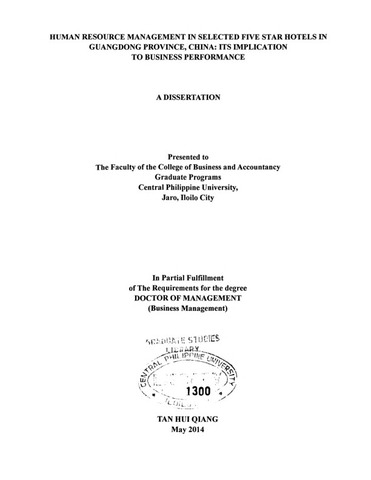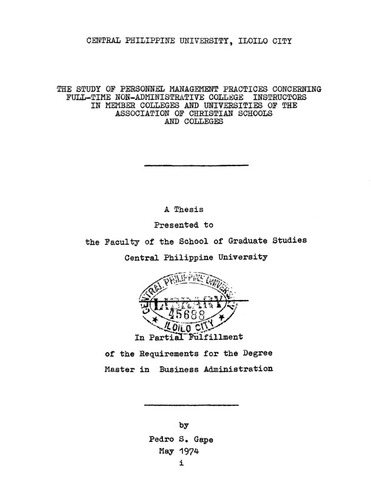Показать сокращенную информацию
Human Resource Management in selected five star hotels in Guangdong Province, China: Its implication to business performance
| dc.contributor.adviser | David, Fely P. | |
| dc.contributor.author | Tan, Hui Qiang | |
| dc.coverage.spatial | Guangdong | en_US |
| dc.coverage.spatial | China | en_US |
| dc.date.accessioned | 2021-03-12T01:02:48Z | |
| dc.date.available | 2021-03-12T01:02:48Z | |
| dc.date.issued | 2014 | |
| dc.identifier.citation | Tan, H. Q. (2014). Human Resource Management in selected five star hotels in Guangdong Province, China: Its implication to business performance (Unpublished Doctoral dissertation). Central Philippine University, Jaro, Iloilo City. | en_US |
| dc.identifier.uri | https://hdl.handle.net/20.500.12852/598 | |
| dc.description | Abstract only | en_US |
| dc.description.abstract | The study was conducted to describe and compare the human resources management practices of three five-star hotels in Guangdong, China, particularly, their hiring process, recruitment, selection, orientation, training and development, and performance appraisal. Moreover, the study also determined and compared the hotels’ organizational commitment; strengths, weaknesses, opportunities and strengths, and the HRM problems and challenges they were facing, and generated recommendations and implications of the findings on the development of the HRM of hotels. This is a descriptive-comparative study that utilized extensive review of hotel documents, questionnaire administration to HR personnel, in-depth interview with hotel managers and HR department heads, internet search, and personal observation. The three hotels covered by this study, Hotels A, B, and C have similar distinctive features and have more or less the same target market. They were all economically stable, and they cater to different levels of guests. Hotel A highlights its own business hotel features; Hotel B boasts of its superior spa resources, while Hotel C promotes its sea view elements. All these are reflected in their vision, mission and goals. Hotel A and Hotel B have linear functional structure; while Hotel C has a functional structure. The unique cultures of the three hotels reflect their respective style and pursuits. Because they have different positioning and strategies, they also have different concepts of corporate culture, goals and tasks. The recruitment processes of the three hotels differ from each other. They have different sources of recruits, and use different forms of advertisement. Hotel A has more recruitment requirements compared to Hotel B and Hotel C. Hotel A and Hotel C have recruitment plan, but Hotel B does not. The three hotels also have different external recruitment sources. Reference checking is common to the three hotels in selecting employees. Interview and testing are used by Hotel A and Hotel C, but B only use interview. The three hotels apparently give premium to orientation. They all offer orientation programs, with different individuals conducting the orientation. Training of employees is compulsory in the three hotels. They all have training plans and the knowledge and skills acquired through training are evaluated and used as basis for promotion and/retention. All the hotels offer incentive program for good performance and retention. The employees of two hotels know that they are being evaluated since the appraisal purposes, schedule and dimensions are clearly communicated to them, but this is not so in the other hotel. Salaries and benefits provided by the three hotels differ. Hotel C gives more benefits and incentives to their personnel, and these are very specific in the labor contract. These are not so specific in Hotel B. | en_US |
| dc.format.extent | xiii, 133 leaves | en_US |
| dc.language.iso | en | en_US |
| dc.rights | Attribution-NonCommercial-NoDerivs 3.0 Philippines | * |
| dc.rights.uri | http://creativecommons.org/licenses/by-nc-nd/3.0/ph/ | * |
| dc.subject.ddc | GSL Theses 658.0072 T153 | en_US |
| dc.subject.lcsh | Personnel management | en_US |
| dc.subject.lcsh | Hotels--Personnel management | en_US |
| dc.subject.lcsh | Hotels--Personnel management--Employees--Training of | en_US |
| dc.subject.lcsh | Occupational training | en_US |
| dc.subject.lcsh | Employees--Recruiting | en_US |
| dc.subject.lcsh | Organizational commitment | en_US |
| dc.title | Human Resource Management in selected five star hotels in Guangdong Province, China: Its implication to business performance | en_US |
| dc.type | Dissertation | en_US |
| dc.description.bibliographicalreferences | Includes bibliographical references | en_US |
| dc.contributor.chair | Delicana, Lilia A. | |
| dc.contributor.committeemember | Curcero, Teresita A. | |
| dc.contributor.department | School of Graduate Studies | en_US |
| dc.description.degree | Doctor of Management major in Business Management | en_US |
| local.subject | Human resource management | en_US |
| local.subject | Business performance | en_US |
| local.subject | Five star hotels | en_US |






